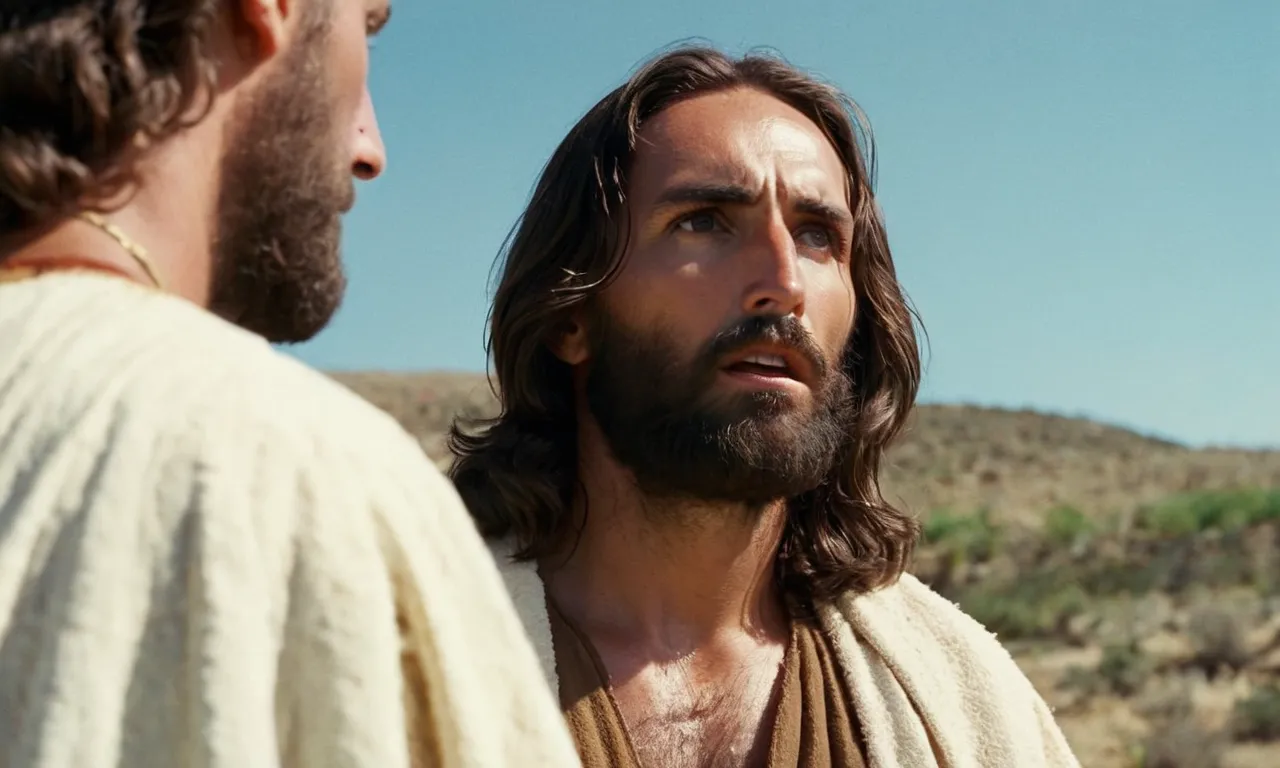Why Did Jesus Call Peter Satan?
The question of why Jesus called Peter ‘Satan’ has puzzled many readers of the Bible. At first glance, it seems harsh for Jesus to label one of his closest disciples this way. However, a closer look at the context reveals there were important reasons behind Christ’s strong words.
If you’re short on time, here’s a quick answer to your question: Jesus called Peter ‘Satan’ because Peter was tempting Jesus to avoid the path of sacrificial death that was necessary for the salvation of the world.
Jesus rebuked Peter harshly to make clear that his role as Messiah involved the cross.
In this in-depth article, we will examine the full biblical context behind Jesus’ words, analyze what exactly Peter said to prompt this response, and explore the significance of the ‘Satan’ label. With scholarly input, we will reveal the complexity behind this fascinating interaction between Christ and his leading apostle.
The Context: Jesus’ First Prediction of His Death
Jesus’ Ominous Words About His Coming Death and Resurrection
In Matthew 16, we find an interesting exchange between Jesus and His disciples where He plainly tells them about His coming death and resurrection. This was likely very confusing and alarming to the disciples, who expected the Messiah to be a conquering King, not a suffering servant.
Jesus began by asking His disciples who people thought He was (Matthew 16:13-14). After hearing their answers, He asked more pointedly who they thought He was. Simon Peter answered correctly that Jesus was the Christ, the Son of the living God (Matthew 16:16).
Jesus affirmed this and said it had been revealed to Peter by God.
But immediately after this, Jesus “began to show His disciples that He must go to Jerusalem, and suffer many things from the elders and chief priests and scribes, and be killed, and be raised up on the third day” (Matthew 16:21).
This was Jesus’ first clear prediction of His coming death and resurrection.
Peter’s Strong Objection and Jesus’ Harsh Response
Understandably, Peter was disturbed by Jesus’ words about being killed. He took Jesus aside and actually rebuked Him, saying, “God forbid it, Lord! This shall never happen to You” (Matthew 16:22). Peter was so bold as to contradict Jesus’ own words about God’s will.
In response, Jesus turned and rebuked Peter in front of the other disciples. “Get behind Me, Satan! You are a stumbling block to Me; for you are not setting your mind on God’s interests, but man’s” (Matthew 16:23). This seems like a very harsh response!
But Jesus recognized that Peter, however well-meaning, was being used by Satan to try to deter Him from the cross.
Jesus went on to explain that following Him would require taking up one’s cross. He was making it clear that He was on the path to being crucified, and His disciples must be willing to face death as well.
This encounter shows that even the most stalwart disciples struggled to understand what Jesus’ mission truly entailed. But Jesus did not waver from His commitment to die for the sins of the world, despite resistance even from His close friends.
The Messianic Expectations Behind Peter’s Objection
The Jewish Hope for a Powerful Political Messiah
Many first century Jews longed for a messiah who would be a mighty political leader to deliver them from Roman oppression. There was an expectation that the messiah would raise an army, defeat Israel’s enemies, and bring in the kingdom of God as an earthly political reign centered in Jerusalem (see this article).
This view is seen in the Dead Sea Scrolls and in writings such as the Psalms of Solomon.
The Jews looked to prophecies such as Daniel 2, where an everlasting kingdom would arrive to crush earthly kingdoms, and Isaiah 11 about the coming heir to the throne of David who would strike the earth with the “rod” of his mouth.
Passages like these fueled the longing for a militaristic messiah to conquer Israel’s foes.
Even the disciples shared this expectation prior to fully realizing who Jesus was, as seen when James and John asked to sit at Jesus’ left and right hand in power (Mark 10:35-37) and when Peter slashed off the ear of the high priest’s servant as Jesus was being arrested (John 18:10).
Peter’s View of Jesus’ Messiahship
Peter declared Jesus to be the long-awaited messiah and “Son of the living God” (Matthew 16:16). However, he still clung to traditional messianic views of military conquest. After Jesus’ shocking prediction of his coming suffering and death, Peter took him aside and rebuked him, saying “This will never happen to you!”
(Matthew 16:22).
Jesus’ stern response, “Get behind me Satan!” indicates that Peter’s objection aligned him temporarily with the adversary’s purposes rather than God’s. Though well-meaning, Peter could not yet conceive of the true nature of the Messiah’s mission – to suffer and die as an atoning sacrifice for sin before being glorified.
Additional instances show Peter still expecting Jesus to take political action, such as at the Last Supper when Peter declared he would never abandon Jesus and even die with him if necessary. He also impulsively struck the servant’s ear when Jesus was seized.
Peter in this stage did not understand critical prophecies like Isaiah 53 and Psalm 22 of a suffering servant messiah. Though proclaiming Jesus as the Christ, his vision was still predominantly for liberation from Rome rather than redemption from sin through a sacrificial death and resurrection.
Jesus later commended Peter for receiving divine revelation about his identity (Matthew 16:17), yet had to sharply correct his human conception about the messianic mission. As Peter grew in understanding, he would boldly proclaim the substitutionary atonement of Christ (1 Peter 2:24).
Jesus Saw in Peter the Temptation to Avoid the Cross
According to the Gospel accounts, Jesus knew from the beginning that He had come to give His life as a ransom for many (Mark 10:45). His sacrificial death on the cross was necessary to atone for the sins of humanity.
However, when Jesus foretold His coming suffering and death to His disciples, Peter took Him aside and began to rebuke Him, saying, “Far be it from you, Lord! This shall never happen to you.” (Matthew 16:22). Jesus responded harshly, saying to Peter, “Get behind me, Satan! You are a hindrance to me.
For you are not setting your mind on the things of God, but on the things of man.” (Matthew 16:23). Why did Jesus equate Peter’s refusal to accept His death to an attack from Satan himself?
Jesus Had a Clear Vision of His Necessary Sacrifice
From the very beginning of His ministry, Jesus had foreknowledge that He had come specifically to give His life as an atoning sacrifice. At the inauguration of His public ministry, when John hesitated to baptize Jesus, saying that Jesus should baptize him instead, Jesus replied, “Let it be so now, for thus it is fitting for us to fulfill all righteousness” (Matthew 3:15).
Jesus was focused on His mission to perfectly fulfill the righteous requirements of the Law on behalf of sinners.
Later in His ministry, Jesus began plainly telling His disciples that He would suffer many things at the hands of the elders and chief priests and scribes, be killed, and on the third day be raised (Matthew 16:21). His ultimate purpose was to come and give His life to purchase redemption for many.
As the time drew near, the Gospels record, “He set his face to go to Jerusalem” (Luke 9:51). With unwavering resolution, Jesus moved toward His sacrifice.
Knowing that Jesus was absolutely resolved to complete His mission, even to the point of death, helps explain His strong rebuke of Peter. Peter was ignorantly opposing the very purpose for which Christ had come.
Peter Unwittingly Aligned Himself With Satan’s Purposes
Earlier in Jesus’ ministry, Satan had tempted Him in the wilderness to forsake the way of the cross in exchange for worldly glory and power (Matthew 4:1-11). “Fall down and worship me,” Satan demanded, “and I will give you all the kingdoms of the world and their glory.” Of course, Jesus refused.
He would not abandon His mission for any price. Peter, though unwittingly, was making a similar appeal – to go another way than the way of the cross.
In addition, Peter’s statement echoed the desire of unbelieving Jews. The religious leaders wanted a Messiah on their own terms – as a conquering king bringing political liberation from Rome. They had no room for a suffering servant coming to save them from sin, so when Jesus presented Himself that way, they conspired to have Him crucified.
Peter’s refusal to accept Christ’s necessary death sounded too much like the very unbelief that would hand Jesus over to be killed.
Viewing Peter’s tempting offer in the context of Satan’s temptation and the Jewish rejection of the Suffering Servant helps explain Jesus’ severe rebuke. He recognized Satanic opposition in Peter’s words and acted swiftly and harshly.
Later, no doubt kinder explanations of His sacrifice helped restore Peter, who repented and went on to preach the same Christ crucified that he once rejected (Acts 2:22-24).
The Deeper Meaning of Calling Peter ‘Satan’
An Aramaic Play on Words
When Jesus called Peter “Satan” in Matthew 16:23, he was likely using an Aramaic play on words. In Aramaic, the name “Peter” is “Cephas” which means “rock.” The word for “Satan” in Aramaic is very similar – “shaytan.”
By calling Peter “Satan,” Jesus may have been saying, “Hey Rock, you’re acting like a stumbling block!” This wordplay reveals Jesus’ frustration with Peter’s objections to the path ahead.
A Severe Warning for Peter
Jesus’ harsh rebuke of Peter was a severe warning. Just moments earlier, Peter had declared Jesus to be the Messiah. But when Jesus explained that he would suffer and die, Peter took him aside and objected.
Jesus saw that Peter still did not understand the spiritual nature of Messiah’s mission. By calling Peter “Satan,” Jesus made clear that self-preservation and earthly ambitions had no place in his Kingdom. Peter’s mindset would lead to temptation and sin.
A Lesson on the Centrality of the Cross
Ultimately, Jesus called Peter “Satan” because his friend’s objection revealed a lack of understanding of the centrality of the cross. Peter was thinking from a worldly perspective, not God’s spiritual perspective.
Ironically, the disciple who just declared Jesus’ true identity was now speaking the words of the devil by denying the necessity of the cross. Jesus’ harsh words were meant to make it abundantly clear that the path to glory would be through suffering and willing self-sacrifice, not earthly power and prestige.
Peter’s Eventual Understanding of Christ’s Rebuke
Peter’s Continued Resistance to Jesus’ Death
Even after Jesus rebuked Peter for trying to prevent His death, Peter continued to resist the idea that Jesus had to die. At the Last Supper, when Jesus said one of His disciples would betray Him, Peter insisted on knowing who it was (John 13:24-26).
Later that night, when Jesus was arrested, Peter drew his sword and cut off the ear of the high priest’s servant in an attempt to protect Jesus (John 18:10-11). Clearly, Peter still did not understand that Jesus’ death was necessary and inevitable.
The Transformative Impact of Pentecost on Peter
However, after Jesus’ resurrection and ascension, Peter experienced a remarkable transformation at Pentecost. When the Holy Spirit fell on the believers, Peter gained new courage and insight. He boldly preached the gospel and called people to repentance (Acts 2:14-41).
From then on, Peter embraced Jesus’ death as the fulfillment of prophecy and the means of salvation (Acts 2:22-24). The coming of the Spirit equipped Peter to finally understand Christ’s mission.
How Peter Responded Differently After the Resurrection
After Pentecost, Peter responded very differently when facing persecution for his faith. When beaten and jailed for preaching about Jesus, Peter rejoiced “because they had been counted worthy of suffering disgrace for the Name” (Acts 5:41). When eventually martyred, Peter did not resist.
He willingly died for the sake of the gospel message he once tried so hard to prevent. Peter finally grasped that Jesus’ shameful death resulted in the greatest triumph in history – the salvation of lost sinners like him.
Conclusion
In conclusion, Jesus’ harsh words to Peter remind us that the path of following Christ leads to the cross. Though Peter failed to grasp this essential truth in the moment, the Lord’s firm rebuke redirected him towards embodying the kind of sacrificial love displayed by Jesus.
As Peter grew to embrace the cross, he became the rock-solid leader Christ knew he could be.
When we face the temptation to reject the suffering that accompanies faithful discipleship, we would do well to recall Jesus’ words to Peter. By taking up our cross daily, we align ourselves with God’s redemptive plan for the world, rather than the competing agenda of the enemy.








